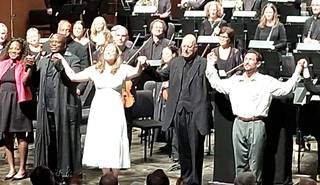|
Back
The Triumph of Dreams New York
Annandale-on-Hudson (Bard College, Fisher Center, Sosnoff Theater)
08/17/2025 -
Bohuslav Martinů: Julietta, or The Key to Dreams, H. 253
Erica Petrocelli (Julietta), Aaron Blake (Michel), Rodel Rosel (Police Chief, Clerk), Alfred Walker (Man with Helmet, Seller of Memories, Blind Beggar), Kevin Thompson (Man in Window, Grandfather Youth, Convict), Isabelle Kosempa (Young Arab, First Man, Young Sailor, Bellhop), Philip Cokorinos (Old Arab, Grandfather, Old Sailor), Krysty Swann (Bird Seller, Second Man, Palm Reader), Taylor Raven (Fish‑seller, Third Man, Grandmother, Old Lady)
Members of the Bard Festival Chorale, James Bagwell (Choral director), American Symphony Orchestra, Leon Botstein (Music director)
Marco Nisticò (Director), John Horzen (Video and projection design), Alex Zucker (Supertitle translation)

K. Swann, A. Walker, E. Petrocelli, L. Botstein, A. Blake
(© Giselle A. Katt)
“The artist is always searching for the meaning of life, his own and that of mankind, searching for truth. A system of uncertainty has entered our daily life. The pressures of mechanization and uniformity to which it is subject call for protest and the artist has only one means of expressing this, by music.”
Bohuslav Martinů
“Memories for sale! Memories for Sale!”
Act 3, Julietta, Georges Neveux/Bohuslav Martinů
It’s time to brush off the miracle of Lazarus. In his 50th year as President of Bard, with dozens of years at the American Symphony Orchestra, Leon Botstein has risen Bohuslav Martinů not from the dead, but from a Purgatory, as one of the major composers of the last century.
After three weeks of music by Martinů and his contemporaries at the Bard Festival, the Czech composer, ignored by the plebs, has soared to the apogee of music. And as we lovers of Czech music always knew, the pantheon of Stravinsky and Schoenberg must be joined by this most prolific composer, for whom major, minor and modal were the building blocks of frequently indescribable music.
Yesterday we heard in a quasi-staged performance his monumental opera Julietta, based on a play by Georges Neveux. The surrealistic story deals with memory (and its loss), dreams (and their consequences), obsession (with the memory of a dream) and a panoply of strange characters in a stranger Central European town. A police chief, a memory salesman, two Arabs, a palm‑reader, a life‑imprisoned convict–who are either dream persona, or builders of their own dreams.
Add to this Julietta herself. Three years before the opera, a traveling Parisian bookseller had heard her voice, glimpsed her face, returned to finally meet. And found himself in a town of dreams, municipal amnesia, the illusions of violence and the broken image of adoration.
And how did Leon Botstein make a reality of the libretto ephemera? First, by simply following Martinů’s score (and the composer was a phenomenal orchestrator), Mr. Botstein brought forth rainbow hues, explosive climaxes, and a meeting of choruses, orchestras and a near perfect group of soloists.
First of whom was the only “real” person, played by the remarkable Aaron Blake. Virtually never leaving the stage, he was not an operatic hero. He was baffled, humorous, a victim of Julietta and the townsfolk. He had to play ignorant and disoriented and bewildered, both frightened and–strangest of all–sucked into the dreams themselves. Mr Blake’s tenor was always clear, always dramatic in the changing drama itself.
Yes, he is an opera singer, but I was reminded of Alfred Drake, the great Broadway tenor who could easily have been at the Met.
Martinů had a strange heroine in Julietta. Like Turandot, she doesn’t appear until the end of the First Act. And even then, soprano Erica Petrocelli’s voice is heard more offstage than on. In such an opaque story, I was a bit taken aback by Ms Petrocelli’s oh so operatic voice, though this was itself a vocal illusion.
Except for the “duet” in Act Two. That is in quotes since the opera hasn’t a single aria or duet. It is a sung play. And in this section, Ms Petrocelli sings about her romantic history with Mr Blake–until she ridicules him for believing there was a history.

The Cast (© Giselle A Katt)
I can’t possibly list all the wonderful other voices here. Each had a character of its own (or, with three or parts each, their multi‑characters.)
Yet there was more. John Horzen’s background video projections were, thank heaven, rarely literal. Yes, a garish painting of the anonymous town. But otherwise graphic scribbles, the starlit universe, a steamboat or train. (The bookseller arrived by train, though he is assured there’s no train station.)
The change of costumes was lovely. Central European headgear, a police uniform, a dream‑seller looking like an MTA teller. And the girls, rarely solos, wore either dainty dresses or–for the great Krysty Swann–an outrageous unexplainable robe/gown.
Leon Botstein’s past genius has been uncovering long-buried music. Julietta is hardly buried, but he elevated it to the surface, allowing dreams, amnesia, fantasy and phantasmagoria to sing, Mr Botstein elevated his audience and excelled by making Martinů’s soaring imagination a non-realistic reality.
Harry Rolnick
|